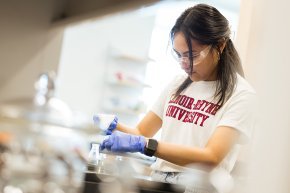
Chemical innovations in undergraduate research
It’s hard to overestimate the value of antibiotics to human civilization, but increased statistics for allergic reactions and drug-resistant resistant bacteria have pressed researchers at all levels to explore alternatives to humans’ reliance on antibiotics. One of those researchers is chemistry major Gezell Alberto-Tenjhay ’24.

“Vitex is a plant that has a long history of use to treat gynecological disorders. There’s a lot of evidence showing it also has antifungal properties, so I’m investigating whether it also has any antimicrobial properties. If it does, it could be a potential source for a plant-derived antibiotic,” she explained.
Also known as chasteberry, the history of Vitex agnus-castus traces back to ancient Greece and Turkey. Current research shows Vitex influences hormone levels, which supports its centuries of use to treat menstrual discomfort, ease menopausal symptoms and enhance fertility. In topical applications, evidence indicates it works as both an antifungal and insect repellent.
Alberto-Tenjhay said, “When I was developing my research proposal, I started with antibiotics, but I also got curious about phytochemicals, which are just chemicals derived from plants. My proposal brought the two together.”
Vitex made a strong research candidate because it is readily available as a supplement, and its effectiveness as an antifungal suggested it may be effective against microbes. To Alberto-Tenjhay’s knowledge, hers is the only study of its kind underway in the current scientific landscape.

“There was one study with Vitex essential oils that showed some antimicrobial effects against oral bacteria, but otherwise, there’s very little research on what it does to bacteria, just fungus,” she said. “That one study focused on essential oils, but I’m looking at the plant extract because I wanted to fill that gap in the research, take it in another direction.”
All undergraduates majoring in the sciences at Lenoir-Rhyne complete an original research study. Chemistry majors’ research spans their junior and senior years. In the first two semesters, students compose their proposals before they develop and test the methods they will use to prove their hypothesis. In the second two semesters, students conduct research, record their data and present their findings.
“Right now, I’m extracting the chemicals from Vitex samples and analyzing them through gas chromatography-mass spectrometry, which enables me to see the compounds in the plant extract,” explained Alberto-Tenjhay. “I just did my second extraction.”
Once the extract is isolated, the testing begins. “I’ll be exposing different bacteria to the extract and comparing its effectiveness with antibiotics to determine if the extract is effective and efficient.”
If the study determines Vitex extract is antimicrobial, another researcher can use Alberto-Tenjhay’s initial findings to pick up the next step and analyze each compound to locate the active ingredients in Vitex.
Alberto-Tenjhay hopes this research will move her along the path to her goal of attending pharmacy school and possibly moving into full-time pharmaceutical research or hospital pharmacy.
“I was always interested in biology and chemistry,” she said. “When I was a senior in high school, I volunteered at Catawba Valley Medical Center. Being in the pharmacy there really focused my interest.”

Lenoir-Rhyne appealed to her for many reasons — proximity to her family, options for honors study and professional development resources — but access to research was a driving factor.
“I was already looking ahead to graduate school when I was applying to college. The format of this program really prepares you for the next step. At the same time, it’s small enough that we get the support and interaction with our professors to give us the confidence to take that next step.”

Lenoir-Rhyne University students showcased their academic excellence and research expertise at the 2025 North Carolina Academy of Science (NCAS) annual meeting in late March.
View More
Lenoir-Rhyne University has selected Summer McGee, Ph.D, as the institution’s 13th president. Her appointment was enthusiastically approved by the Lenoir-Rhyne Board of Trustees after a national search.
View More